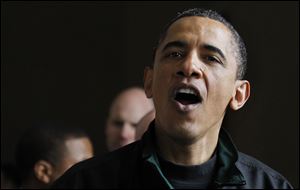
Obama eyes long-term budget goal
Changes to Medicare, Medicaid part of agenda
4/11/2011
President Barack Obama speaks to visitors at the Lincoln Memorial.
WASHINGTON -- President Obama this week will call for a broad plan to raise revenues and cut deficits, as the battle over fiscal issues moves past the budget deal and into a broader and more consequential debate over the nation's long-term fiscal health.
In a speech to be delivered at a university in Washington on Wednesday, Mr. Obama will call on Congress to join him in writing a multiyear debt-reduction plan that would depart significantly from the one proposed by House Republicans, administration officials said.
The Republican plan includes an overhaul of Medicare and trillions of dollars in tax cuts, while sparing defense spending.
Mr. Obama, by contrast, envisions a comprehensive plan that would include tax increases for the richest taxpayers and military spending cuts as well as savings in Medicare and Medicaid, along with changes to Social Security that the administration says will ensure its solvency for decades, much as his fiscal commission recommended in December.
In his remarks, which come after Friday's bipartisan deal cutting domestic spending by about $38 billion for the remainder of this budget year, Mr. Obama will not offer details but will set deficit-cutting goals, White House officials said. The numbers, too, are still under discussion.
"He'll lay out his approach this week in terms of the scale of debt reduction he thinks the country needs so we can grow economically and win the future, a balanced approach," David Plouffe, the senior White House political strategist, said on Fox News Sunday, one of four talk shows that he appeared on Sunday.
"Obviously, we need to look at all corners of government," Mr. Plouffe said, adding, "We're going to have a big debate."
Until now, Mr. Obama has avoided prescribing further specific changes to programs such as Medicare.
Indeed, few of the recommendations made by his own bipartisan fiscal commission were included in the budget he presented to Congress in February.
What is more, while Mr. Obama proposed a five-year freeze on the growth of domestic spending, he recommended increases in education, research, infrastructure, and clean-energy programs -- emphasizing that though deficit reduction is important to the economy, so are investments to create jobs and skilled workers.
Whether anything tangible comes of the debate it will contrast the parties' visions of the role of government like no other.
Republicans reacted skeptically to word of Mr. Obama's speech.
"It's really hard to believe what this White House and the President is saying," said Rep. Eric Cantor of Virginia, the House majority leader, on Fox.
The timing of Mr. Obama's remarks reflects a White House strategy devised last year after Republicans won their House majority, together with the confluence of four events -- two last week and two ahead.
The 11th-hour agreement on spending cuts, which averted a government shutdown, removed what had been a months-long distraction over this year's unfinished federal budget.
Administration officials said they also hoped the compromise, focused on six months of government spending, helped build trust with House Speaker John A. Boehner (R., Ohio) that will carry over to the larger debates about long-term spending and the national debt.
While some lawmakers said Sunday they opposed the compromise, leaders in both parties remain confident it will pass when it is presented for a vote on Thursday.
Also last week was the moment the administration has been awaiting for months: Rep. Paul D. Ryan of Wisconsin, the House Budget Committee chairman, outlined House Republicans' long-term budget plan.
It would cut $6 trillion in the coming decade -- turning Medicare into a voucher program for future generations and slashing spending for the need-based Medicaid program and other domestic budget lines -- while largely sparing the Pentagon and cutting $4 trillion more in corporate and high-income taxes.
Perhaps the biggest prod for Mr. Obama to act, however, is the need for Congress to vote to raise the legal limit on the federal debt, now $14.25 trillion. That moment may come in five weeks. Without an increase, no later than July, the government cannot continue to finance payments on its debt, potentially forcing it into an economy-shaking default.
Speaking on Saturday in Connecticut, Mr. Boehner said Republicans would not agree to raise the limit "without something really, really big attached to it."
Unlike in the recent spending-cut negotiations, in which Mr. Obama was not active until the final days, "he knows he has to take a greater role from the beginning" on the debt-limit measure and any companion plan for reducing debt, said an adviser who spoke on the condition of anonymity.
The risk to Mr. Obama includes further alienating liberals in his own party. Progressive groups have formed coalitions to oppose any changes to Social Security, for instance.
As more details of the budget deal between Mr. Obama and congressional leaders trickled out Sunday, lobbyists and lawmakers stepped up their efforts to secure or kill specific provisions benefiting wolf hunters in Montana, profit-making colleges, and various public works projects.
Mr. Obama, Mr. Boehner, and the Senate majority leader, Harry Reid, reached the agreement just hours before the government would have shut down for lack of spending authority to cover the remainder of the fiscal year.
But it became evident they had yet to work out the details of the agreement, which would cut roughly $38 billion from a federal budget expected to exceed $3.7 trillion this year.
"You may not be surprised to hear this, but they're still sifting through the areas where they are going to make cuts," Rep. Chris Van Hollen of Maryland, the senior Democrat on the House Budget Committee, said Sunday on the ABC News program This Week.
A Republican congressional aide said Sunday night that the House and Senate Appropriations committees were working on the fine points, since "thousands of budget line items have to be negotiated."